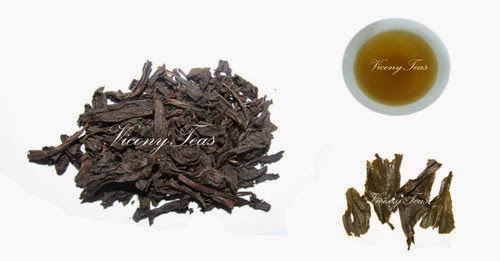TOP 1 Da Hong Pao (Big Red Robe, 大红袍)
It is of course the most famous Wuyi Yancha (Wuyi Rock Oolong) but it is also most difficult to be found of satisfactory quality. In fact, most of Dahongpao you can find in the market are blended ones. Some made of in fact Shuixian or other tea cultivars can be very cheap. Purebred Dahongpao has only a small market share partly due to its small production. Blended Dahongpao has market share of more than 80%. In Chinese tea industry, which one is the genuine Dahongpao is still debated. Some consider it is Qidan while some think it is Beidou. Anyway, the two are of course the ones most suitable to be called as pure Dahongpao.
According to the legend, QiDan, the original name for Dahongpao, refers to tea from the six trees that look red from far away because of their purple-red gender shoots in early spring in Jiulongchao, Mount Wuyi.
Since 2007, Dahongpao tea trees in Mount Wuyi have been specially protected. It is forbidden to pluck their tea leaves to make sure they grow well; tea specialists look after them in a scientific way and detailed record of management is established; the nearby environment is strictly protected. Many years ago Chinese tea specialists started to cultivate Dahongpao trees by stem cutting propagation (asexual propagation).
TOP 2 Tie Luo Han(Iron Warrior Monk 铁罗汉)
Tie Luo Han is one of the Top Four Wuyi Yancha, and also believed to be the earliest Wu Yi tea; with history records dating back to Song Dynasty. The tea bush was first found in a cave (Gui Dong or Ghost Cave) in Hui Yuan Yan, one of the ninety-nine cliffs of Mount Wu Yi. Legend tells that this tea was created by a powerful warrior monk with golden-bronze skin, hence the name Tie Luo Han, which means "Iron Warrior Monk". It has been planted in many areas of Wuyishan Mountain now.
Tie Luo Han produced in core Zhengyan area is very limited in quantities every year and almost unavailable in markets. Tie Luo Han is pursued by Yancha fans because of its supreme quality.
TOP 3 Bai Ji Guan (White Cockscomb 白鸡冠)
Bai Ji Guan, also called White Cockscomb in English, is a member of Si Da Ming Cong (the four famous Wuyi Oolong tea bushes). It is also regarded as one of the most famous Chinese oolong teas. Legend goes that one day a monk saw a rooster sacrifice its life while protecting its child from an eagle. He was moved by the rooster’s courage and then buried its dead body in the ground. However, after a few days, a tea bush grew from the spot where the rooster was buried. In the memory of the rooster, the monk gave the name of White Cockscomb to the tea bush.
Bai Ji Guan is undoubtedly one of the most unique Wuyi Yancha. You can easily tell it apart not only by its appearance but also its taste and flavor. The fresh leaves of the Bai Ji Guan Rock Oolong are yellowish dark. The brewed tea has a bright pale yellow color. It is sweet and uniquely fruity with a lingering mellow fruit and honey note aftertaste, much more delicate than other kinds of Wuyi Yancha in taste.
TOP 4 Shui Jin Gui (Water Golden Turtle 水金龟)
Shui Jin Gui is known for its soft texture and unusually gentle nature. The cup is peachy red with notes of chocolate and toasted nuts. There is also a pleasant reminder of its flowery note, lingering after each sip.
You would be probably interested in:
Wuyi Rock Oolong Tea | Wuyi Yancha FAQ:Photo Gallery of Wuyi Rock Oolong Core Producing Areas








